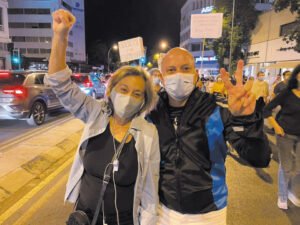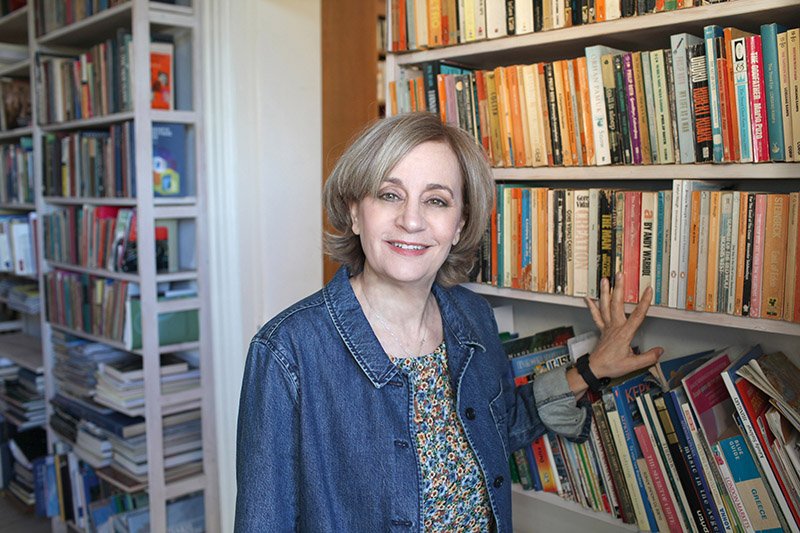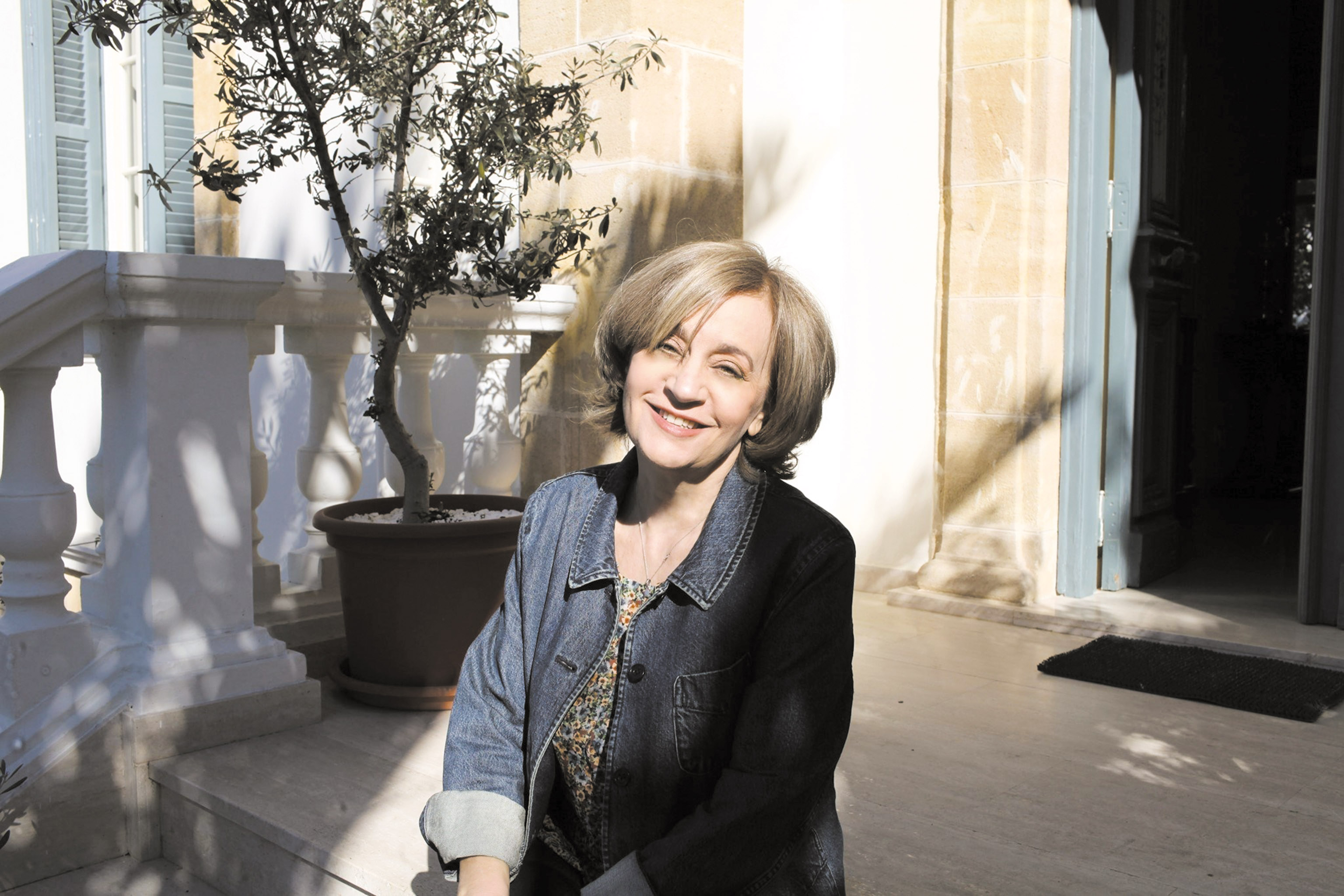THEO PANAYIDES finds there is never a dull moment in the life of a fearless grandma who loves to protest and is now standing to become an MP with the Greens
Alexandra Attalides goes through her phone, showing me pictures of her granddaughter: a five-year-old girl riding a horse somewhere in France, her small frame perched atop the animal with a child’s determination. Look at her, says doting Grandma, flicking through the album to savour every pic: “She’s so fearless!”.
It’s a telling choice of word – not cute, not sweet, but fearless. Alexandra is fearless too, in most ways. Many common phobias (of public speaking, or swimming out to sea by herself) are alien to her. Quite unusually, even though she’s very much a part of the Establishment – well-off, prominent, married to a former ambassador – her life has been marked by a series of street protests.

Taking part in the October demo
She loves the pre-Covid feeling of being in a protest – the passion, the surge of the crowd. It speaks to the activist in her. “I even led my classmates in primary school on a protest,” she recalls (it was to condemn an assassination attempt against Makarios). In the 80s she was among the organisers of ‘Women Walk Home’, marching across the Green Line with Turkish troops cocking rifles inches away from their faces. A decade later, in Paris in the 90s where her husband Michalis was ambassador, she snuck off to join a demonstration against 20 years of the Turkish invasion, and recalls a photo of her son Constantinos – a little blond-haired boy, solemnly waving a Cyprus flag in the pouring rain – making the next day’s issue of Le Monde. Most recently, she was part of last October’s protests against corruption (you can see her in videos, stirring up a masked congregation) following the Al-Jazeera revelations. She even went on a random demo in Spain once, against nuclear weapons, while she was there for an EU summit; those Spaniards know how to protest, she reports with a connoisseur’s delight.
It’s a sunny day as we start to chat, on the back porch of the Attalides family mansion (one of those grand old houses in central Nicosia, by the same architect who designed the State Gallery of Contemporary Art), but rainclouds soon gather and we move inside with the windows open. It’s chilly but she doesn’t complain, both because she’s seen worse – she climbed Mt. Kilimanjaro in 2011, an experience that “stretched my limits” – and because she dislikes complaining in general. She’s friendly, direct, argumentative, and doesn’t stand on ceremony. She talks very fast, taking little sips of green tea, and barely pauses for two hours.
She calls herself a team player, but has never really thrived in an institutional setting – the exception being her 12 years (2008-20) as EU Press Officer in Cyprus, doubtless because, as she says, “I like to work for things I believe in”. At 21 (she’s now 62) she was living the Cypriot Dream, at least as defined by most women of her generation: a job for life in the public sector, specifically at the Cyprus Tourism Organisation, already married (to her first husband, a businessman) and already a mother. At 25 she’d divorced, and at 33 – when she married Michalis, 17 years her senior – she quit the civil service and left for Paris. The couple returned in 2000 and Alexandra, having meanwhile completed an MBA with a focus on European Management at the Solvay Business School in Brussels, became an investment broker – another institutional job she disliked – followed by three years (2004-07) as director of communications at the University of Nicosia and a stint as a freelance writer. Finally, having left the EU last April when her contract expired, she’s now embarking on a whole new (possible) chapter, standing as a candidate with the Green Party in next month’s parliamentary elections. Never a dull moment, eh?

She herself doesn’t seem the noxious type, indeed it’s striking – for someone who protests so much – how content she is. In truth, she was never about root-and-branch revolution. “At school I was always the rebel, that’s what they called me,” she recalls with glee – yet she led a protest against the attempt to kill Makarios, which doesn’t sound too rebellious. Her style takes no prisoners, but her causes have always been noble. She marched against corruption last October, which is obviously admirable – not against lockdowns and Covid measures, which might’ve been more controversial. She’s a free thinker, and voracious reader (she singles out Yuval Noah Harari as a recent author who’s had a big effect on her), yet her personality isn’t the kind to be drawn to harsh or unpopular ideas. “In the middle!” she laughs, when I ask where she usually belongs in a group of friends.
The big idea of our time, of course, is climate change, the EU’s Green Deal being a colossal effort to shape the future and avert disaster – and it’s no surprise that she’s standing with the Greens next month, despite the party’s rather hawkish views on the Cyprus problem. Alexandra doesn’t share those views, she makes clear, but “I have four pillars, which for me are important when it comes to going into politics. The first is climate change, the environment, our future economy – in short, the planet. The second is governance, corruption, transparency, human rights. The third pillar is Europe: the EU, our relationship with the EU, the culture of inclusion and tolerance. And the fourth is the Cyprus problem.” The Greens tick three out of four boxes (no party ticks all four) – and of course they’re emphatic on the first pillar, which is surely the most urgent.
What might she be like as an MP? Active, for sure. Euro-savvy, given her 12 years’ experience. (She’d probably be even more effective as an MEP.) Whether she’d be happy surrounded by party politics and an inert public sector is another matter – and she is, very clearly, a technocrat, vexed above all by incompetence. When it comes to migrants, for instance, “I’m not saying everyone should come to Cyprus” – but would it kill us to organise a two-tier system, so war refugees don’t go in the same pile as fake ‘students’ turned asylum seekers (who almost never succeed but apply for asylum anyway, knowing they’ll take years to be processed)? She’s for social justice and human rights, to be sure, but filtered through the lucid mind of a former broker and card-carrying brainiac who’s always done well in exams, and was always at the top of her class.
Her father insisted on top marks, he was strict that way; he “worked on houses, did repairs,” says his daughter vaguely – but he also loved books, and indeed “my first memory of my dad is of him reading Victor Hugo’s Les Miserables, before I’d even started school… I remember sitting on a little chair in front of the fireplace – my dad had a wonderful voice, and he was reading Les Miserables to us. And I remember crying, I was so upset about the man not having bread to eat, and going to jail for trying to feed his sister’s children”.
Alexandra links her social-justice fervour to that childhood memory – yet an earlier memory may be even more relevant, the entire year she spent in hospital (aged between three and four) after being born with a dodgy hip; she endured several operations, one of which almost killed her. She recalls the pain, the abject loneliness – her mum wasn’t able to come every day – the frequent bullying. The little girl was immobile, lying in bed with her legs in a cast; other children in the ward would pick on her. A visiting uncle brought a doll as a present one day; as soon as the uncle was gone, the doll was grabbed from her and torn to pieces. “In the morning we’d often get smacked by the nurses too – because kids would wet the bed, and of course I couldn’t move at all.” All that early suffering surely played a role in shaping her – maybe in making her more compassionate and attuned to suffering, or perhaps in sparking a compulsion “to do things”.
The middle child of working-class parents has indeed spent her life doing things – studying, working, collecting. She’s a hoarder, whether it’s possessions or friends or diplomas; everything in the house has a back story. She’s also an activist from way back, part of an alternative crowd in the 80s who frequented bohemian dives in old Nicosia and founded groups like the Centre for Women’s Studies and the Friends of Akamas. The invasion was another trauma, much like that year in hospital, a pivotal moment (like Covid now, perhaps?) when the world around her collapsed and had to be refashioned into something new. “We felt responsible for everything,” she recalls. “And I kind of got stuck that way, that I feel responsible for the whole world.”
Working for the EU in the past decade must’ve sharpened her political instincts – but in fact she was always political in the sense of looking after the polis, the common good (she jokes that she’s never been an “idiot”, from the ancient Greek ‘idiotis’ meaning someone not involved in public life). And what of her own inner life? There’s a solitary side to Alexandra, for sure, as if seeking relief from all that endless engagement. She walks for an hour and a half every day, taking advantage of the break to listen to audiobooks (right now it’s Braiding Sweetgrass, a bestseller about plants and botany). She goes swimming in the sea all the year round – and, as already mentioned, likes to push out on her own, going so deep and staying so long that friends start to worry. The sea is her haven, the place where she no longer has to feel responsible; “It’s like the weight of the world falls away from me”. She’s also read quite widely on spiritual matters, and wears a necklace that looks like a cross but turns out to be a star – a gift from her granddaughter, the fearless horse rider.
Alexandra Attalides keeps surprising you, adding little brushstrokes to her portrait; like she said, she has an opinion on everything. She likes to cook, especially Indian, and is currently writing a cookbook (actually a book of stories and recipes). She donates to Save the Elephants every year. She crossed over to the occupied north on the first day the checkpoints opened, always in the thick of the action (she’s that kind of person). She loves to travel, usually reading from a guidebook as her travel companions listen (she’s that kind of person). She clambered up Kilimanjaro on a night so cold even the snot in her nose froze up.
Unlike most politicians, her actual politics seem almost irrelevant – but she’s running for MP, after all, so let’s note for the record that she does believe in a free market “but I also believe the state has a duty to those left behind… I don’t believe in an economy where everyone does what they want and destroys the planet. I don’t believe in the extraction of fossil fuels. I don’t believe that someone can cut down trees just like that, because they want to build there. I don’t believe in towers being constructed, just so some can make money out of it. No!” Her voice rings out, rising in volume and certitude. Sounds like the cue for another street protest.







Click here to change your cookie preferences